HRMT20024 Essay: Analysis of Staff Attraction and Retention Challenges
VerifiedAdded on 2023/06/04
|11
|3782
|459
Essay
AI Summary
This essay, written for HRMT20024, delves into the critical challenges faced in attracting and retaining staff within the hospitality sector. It examines five key elements of human resources: HR planning, recruitment and selection, employee relations, performance management, and motivation, reward, and compensation. The essay highlights the significance of effective HR management in a competitive environment, emphasizing cultural differences and the importance of a skilled workforce. It explores the intricacies of recruitment, selection processes, and the impact of employee relations on business success. Performance management strategies, including setting objectives and providing feedback, are discussed, alongside the importance of employee motivation and compensation. The essay underscores the need for proactive HR policies to navigate the complexities of the hospitality industry and ensure long-term success.

Running Head: HRMT20024
Managing Human Resources
Student’s Name:
Student’s ID:
Managing Human Resources
Student’s Name:
Student’s ID:
Paraphrase This Document
Need a fresh take? Get an instant paraphrase of this document with our AI Paraphraser
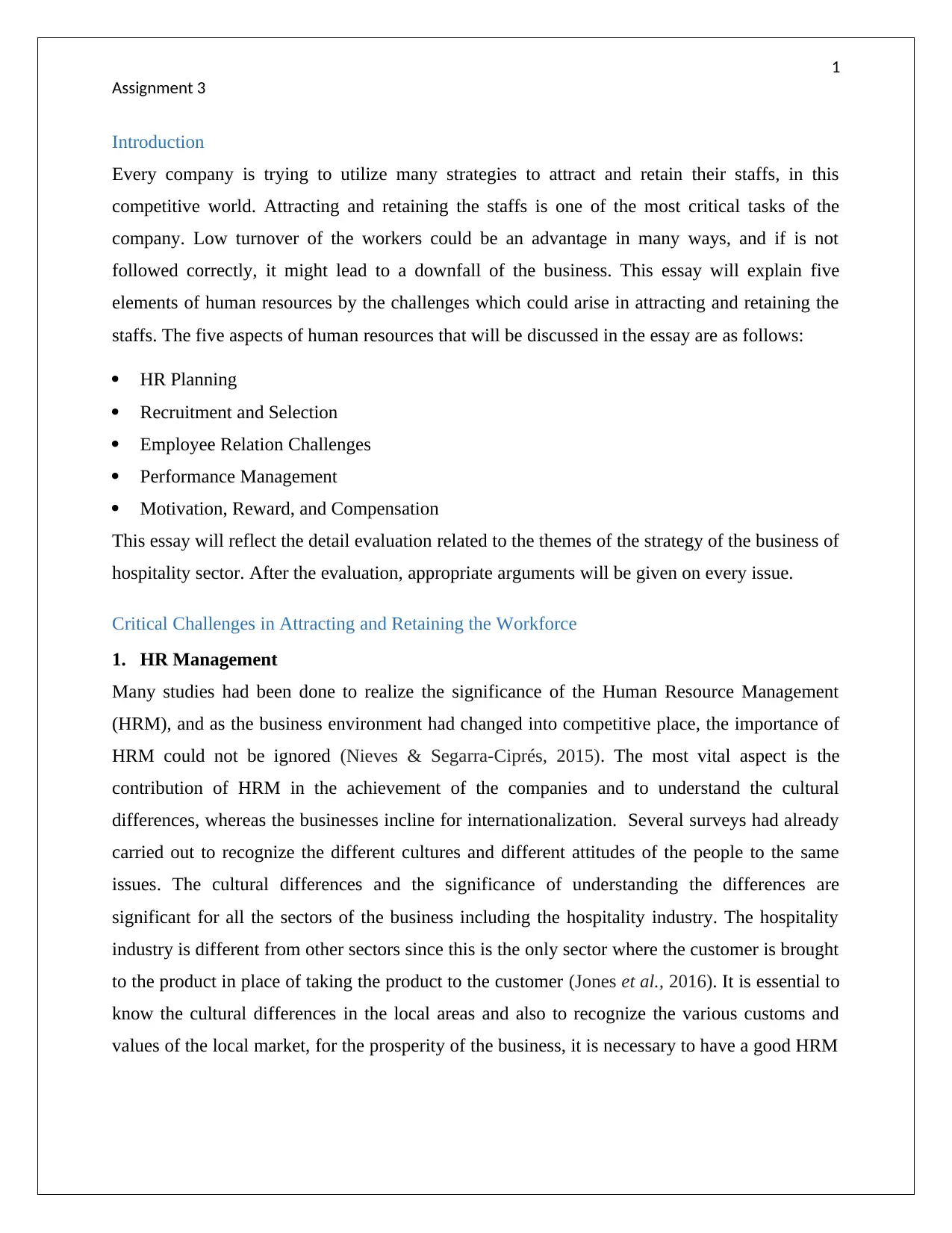
1
Assignment 3
Introduction
Every company is trying to utilize many strategies to attract and retain their staffs, in this
competitive world. Attracting and retaining the staffs is one of the most critical tasks of the
company. Low turnover of the workers could be an advantage in many ways, and if is not
followed correctly, it might lead to a downfall of the business. This essay will explain five
elements of human resources by the challenges which could arise in attracting and retaining the
staffs. The five aspects of human resources that will be discussed in the essay are as follows:
HR Planning
Recruitment and Selection
Employee Relation Challenges
Performance Management
Motivation, Reward, and Compensation
This essay will reflect the detail evaluation related to the themes of the strategy of the business of
hospitality sector. After the evaluation, appropriate arguments will be given on every issue.
Critical Challenges in Attracting and Retaining the Workforce
1. HR Management
Many studies had been done to realize the significance of the Human Resource Management
(HRM), and as the business environment had changed into competitive place, the importance of
HRM could not be ignored (Nieves & Segarra-Ciprés, 2015). The most vital aspect is the
contribution of HRM in the achievement of the companies and to understand the cultural
differences, whereas the businesses incline for internationalization. Several surveys had already
carried out to recognize the different cultures and different attitudes of the people to the same
issues. The cultural differences and the significance of understanding the differences are
significant for all the sectors of the business including the hospitality industry. The hospitality
industry is different from other sectors since this is the only sector where the customer is brought
to the product in place of taking the product to the customer (Jones et al., 2016). It is essential to
know the cultural differences in the local areas and also to recognize the various customs and
values of the local market, for the prosperity of the business, it is necessary to have a good HRM
Assignment 3
Introduction
Every company is trying to utilize many strategies to attract and retain their staffs, in this
competitive world. Attracting and retaining the staffs is one of the most critical tasks of the
company. Low turnover of the workers could be an advantage in many ways, and if is not
followed correctly, it might lead to a downfall of the business. This essay will explain five
elements of human resources by the challenges which could arise in attracting and retaining the
staffs. The five aspects of human resources that will be discussed in the essay are as follows:
HR Planning
Recruitment and Selection
Employee Relation Challenges
Performance Management
Motivation, Reward, and Compensation
This essay will reflect the detail evaluation related to the themes of the strategy of the business of
hospitality sector. After the evaluation, appropriate arguments will be given on every issue.
Critical Challenges in Attracting and Retaining the Workforce
1. HR Management
Many studies had been done to realize the significance of the Human Resource Management
(HRM), and as the business environment had changed into competitive place, the importance of
HRM could not be ignored (Nieves & Segarra-Ciprés, 2015). The most vital aspect is the
contribution of HRM in the achievement of the companies and to understand the cultural
differences, whereas the businesses incline for internationalization. Several surveys had already
carried out to recognize the different cultures and different attitudes of the people to the same
issues. The cultural differences and the significance of understanding the differences are
significant for all the sectors of the business including the hospitality industry. The hospitality
industry is different from other sectors since this is the only sector where the customer is brought
to the product in place of taking the product to the customer (Jones et al., 2016). It is essential to
know the cultural differences in the local areas and also to recognize the various customs and
values of the local market, for the prosperity of the business, it is necessary to have a good HRM
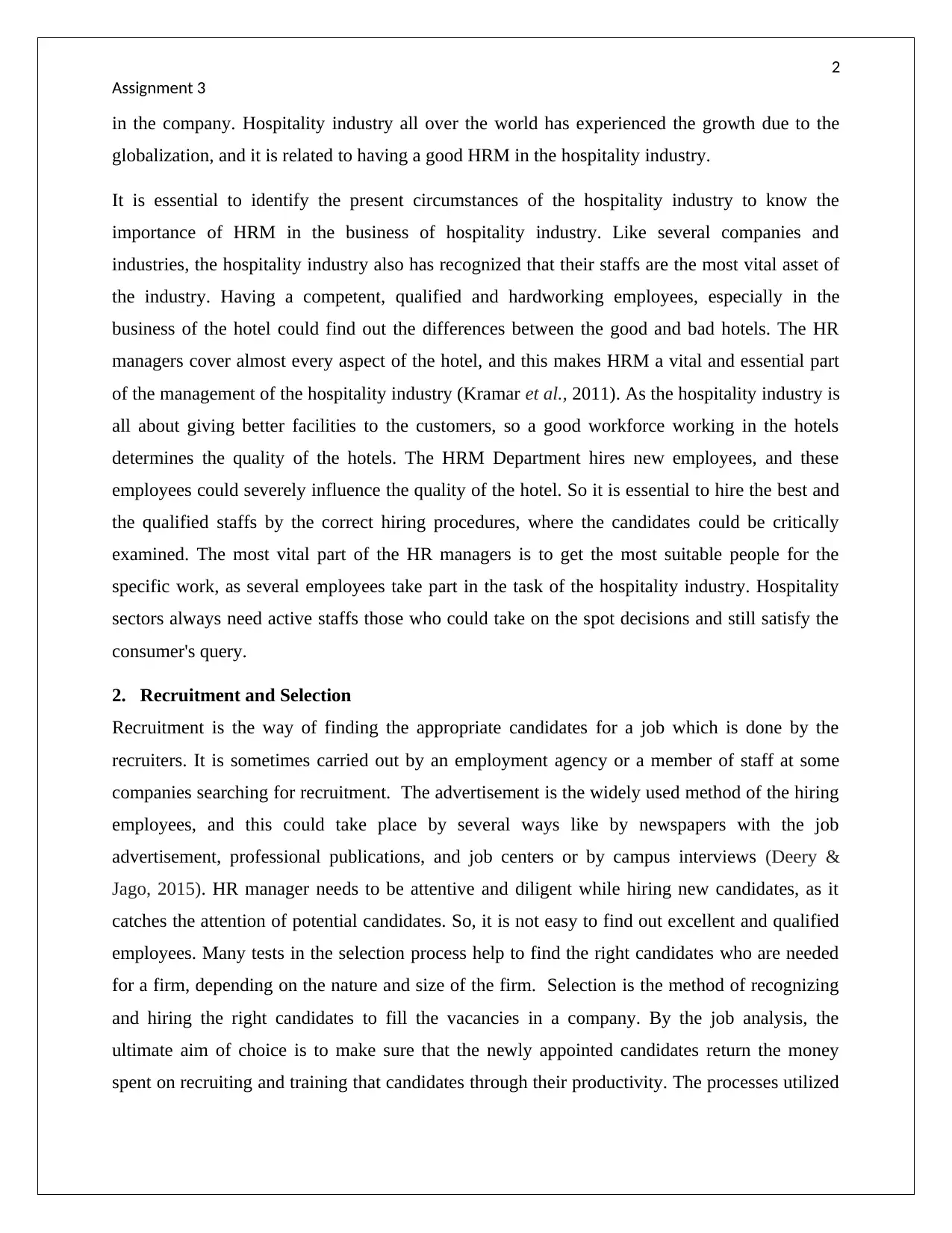
2
Assignment 3
in the company. Hospitality industry all over the world has experienced the growth due to the
globalization, and it is related to having a good HRM in the hospitality industry.
It is essential to identify the present circumstances of the hospitality industry to know the
importance of HRM in the business of hospitality industry. Like several companies and
industries, the hospitality industry also has recognized that their staffs are the most vital asset of
the industry. Having a competent, qualified and hardworking employees, especially in the
business of the hotel could find out the differences between the good and bad hotels. The HR
managers cover almost every aspect of the hotel, and this makes HRM a vital and essential part
of the management of the hospitality industry (Kramar et al., 2011). As the hospitality industry is
all about giving better facilities to the customers, so a good workforce working in the hotels
determines the quality of the hotels. The HRM Department hires new employees, and these
employees could severely influence the quality of the hotel. So it is essential to hire the best and
the qualified staffs by the correct hiring procedures, where the candidates could be critically
examined. The most vital part of the HR managers is to get the most suitable people for the
specific work, as several employees take part in the task of the hospitality industry. Hospitality
sectors always need active staffs those who could take on the spot decisions and still satisfy the
consumer's query.
2. Recruitment and Selection
Recruitment is the way of finding the appropriate candidates for a job which is done by the
recruiters. It is sometimes carried out by an employment agency or a member of staff at some
companies searching for recruitment. The advertisement is the widely used method of the hiring
employees, and this could take place by several ways like by newspapers with the job
advertisement, professional publications, and job centers or by campus interviews (Deery &
Jago, 2015). HR manager needs to be attentive and diligent while hiring new candidates, as it
catches the attention of potential candidates. So, it is not easy to find out excellent and qualified
employees. Many tests in the selection process help to find the right candidates who are needed
for a firm, depending on the nature and size of the firm. Selection is the method of recognizing
and hiring the right candidates to fill the vacancies in a company. By the job analysis, the
ultimate aim of choice is to make sure that the newly appointed candidates return the money
spent on recruiting and training that candidates through their productivity. The processes utilized
Assignment 3
in the company. Hospitality industry all over the world has experienced the growth due to the
globalization, and it is related to having a good HRM in the hospitality industry.
It is essential to identify the present circumstances of the hospitality industry to know the
importance of HRM in the business of hospitality industry. Like several companies and
industries, the hospitality industry also has recognized that their staffs are the most vital asset of
the industry. Having a competent, qualified and hardworking employees, especially in the
business of the hotel could find out the differences between the good and bad hotels. The HR
managers cover almost every aspect of the hotel, and this makes HRM a vital and essential part
of the management of the hospitality industry (Kramar et al., 2011). As the hospitality industry is
all about giving better facilities to the customers, so a good workforce working in the hotels
determines the quality of the hotels. The HRM Department hires new employees, and these
employees could severely influence the quality of the hotel. So it is essential to hire the best and
the qualified staffs by the correct hiring procedures, where the candidates could be critically
examined. The most vital part of the HR managers is to get the most suitable people for the
specific work, as several employees take part in the task of the hospitality industry. Hospitality
sectors always need active staffs those who could take on the spot decisions and still satisfy the
consumer's query.
2. Recruitment and Selection
Recruitment is the way of finding the appropriate candidates for a job which is done by the
recruiters. It is sometimes carried out by an employment agency or a member of staff at some
companies searching for recruitment. The advertisement is the widely used method of the hiring
employees, and this could take place by several ways like by newspapers with the job
advertisement, professional publications, and job centers or by campus interviews (Deery &
Jago, 2015). HR manager needs to be attentive and diligent while hiring new candidates, as it
catches the attention of potential candidates. So, it is not easy to find out excellent and qualified
employees. Many tests in the selection process help to find the right candidates who are needed
for a firm, depending on the nature and size of the firm. Selection is the method of recognizing
and hiring the right candidates to fill the vacancies in a company. By the job analysis, the
ultimate aim of choice is to make sure that the newly appointed candidates return the money
spent on recruiting and training that candidates through their productivity. The processes utilized
⊘ This is a preview!⊘
Do you want full access?
Subscribe today to unlock all pages.

Trusted by 1+ million students worldwide
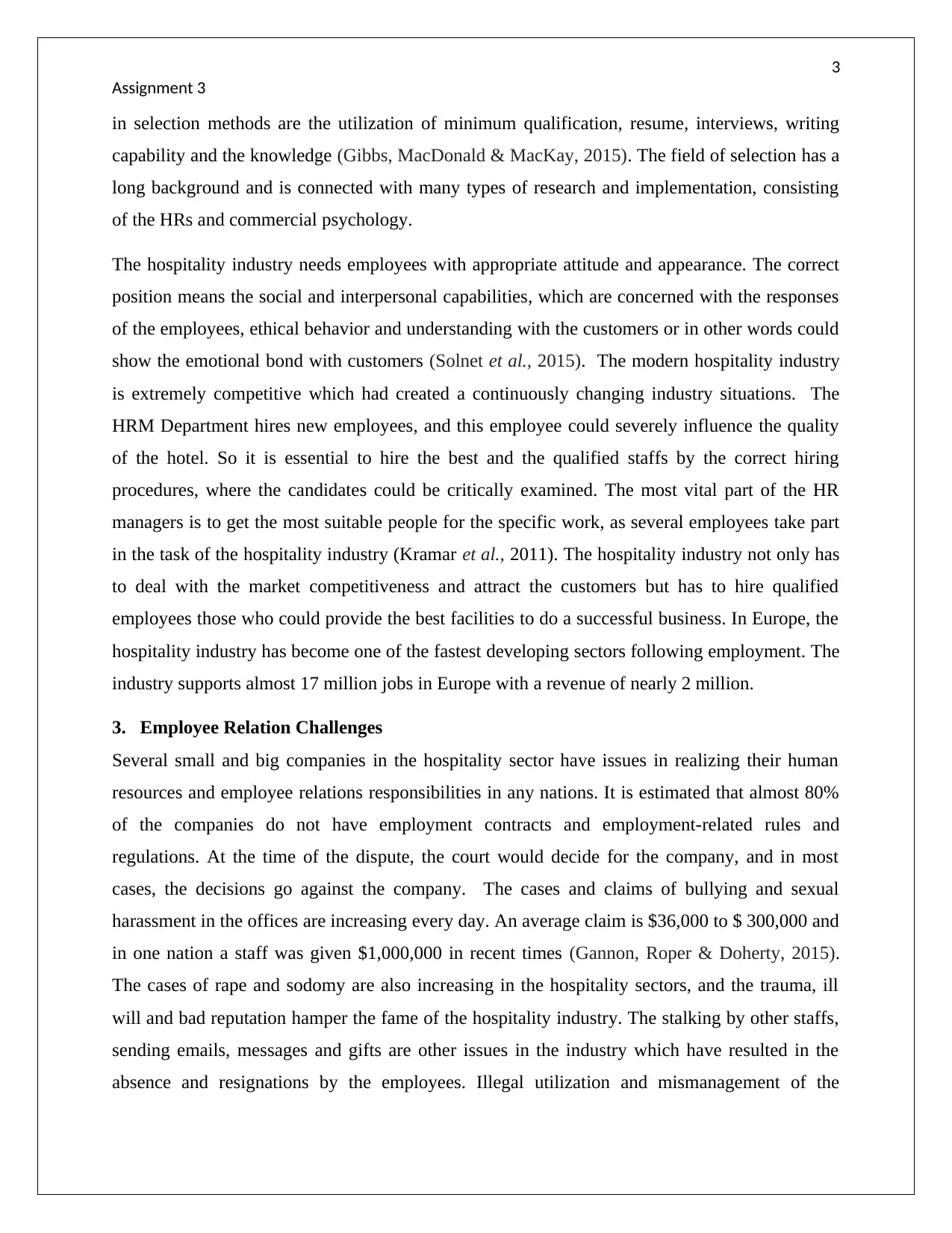
3
Assignment 3
in selection methods are the utilization of minimum qualification, resume, interviews, writing
capability and the knowledge (Gibbs, MacDonald & MacKay, 2015). The field of selection has a
long background and is connected with many types of research and implementation, consisting
of the HRs and commercial psychology.
The hospitality industry needs employees with appropriate attitude and appearance. The correct
position means the social and interpersonal capabilities, which are concerned with the responses
of the employees, ethical behavior and understanding with the customers or in other words could
show the emotional bond with customers (Solnet et al., 2015). The modern hospitality industry
is extremely competitive which had created a continuously changing industry situations. The
HRM Department hires new employees, and this employee could severely influence the quality
of the hotel. So it is essential to hire the best and the qualified staffs by the correct hiring
procedures, where the candidates could be critically examined. The most vital part of the HR
managers is to get the most suitable people for the specific work, as several employees take part
in the task of the hospitality industry (Kramar et al., 2011). The hospitality industry not only has
to deal with the market competitiveness and attract the customers but has to hire qualified
employees those who could provide the best facilities to do a successful business. In Europe, the
hospitality industry has become one of the fastest developing sectors following employment. The
industry supports almost 17 million jobs in Europe with a revenue of nearly 2 million.
3. Employee Relation Challenges
Several small and big companies in the hospitality sector have issues in realizing their human
resources and employee relations responsibilities in any nations. It is estimated that almost 80%
of the companies do not have employment contracts and employment-related rules and
regulations. At the time of the dispute, the court would decide for the company, and in most
cases, the decisions go against the company. The cases and claims of bullying and sexual
harassment in the offices are increasing every day. An average claim is $36,000 to $ 300,000 and
in one nation a staff was given $1,000,000 in recent times (Gannon, Roper & Doherty, 2015).
The cases of rape and sodomy are also increasing in the hospitality sectors, and the trauma, ill
will and bad reputation hamper the fame of the hospitality industry. The stalking by other staffs,
sending emails, messages and gifts are other issues in the industry which have resulted in the
absence and resignations by the employees. Illegal utilization and mismanagement of the
Assignment 3
in selection methods are the utilization of minimum qualification, resume, interviews, writing
capability and the knowledge (Gibbs, MacDonald & MacKay, 2015). The field of selection has a
long background and is connected with many types of research and implementation, consisting
of the HRs and commercial psychology.
The hospitality industry needs employees with appropriate attitude and appearance. The correct
position means the social and interpersonal capabilities, which are concerned with the responses
of the employees, ethical behavior and understanding with the customers or in other words could
show the emotional bond with customers (Solnet et al., 2015). The modern hospitality industry
is extremely competitive which had created a continuously changing industry situations. The
HRM Department hires new employees, and this employee could severely influence the quality
of the hotel. So it is essential to hire the best and the qualified staffs by the correct hiring
procedures, where the candidates could be critically examined. The most vital part of the HR
managers is to get the most suitable people for the specific work, as several employees take part
in the task of the hospitality industry (Kramar et al., 2011). The hospitality industry not only has
to deal with the market competitiveness and attract the customers but has to hire qualified
employees those who could provide the best facilities to do a successful business. In Europe, the
hospitality industry has become one of the fastest developing sectors following employment. The
industry supports almost 17 million jobs in Europe with a revenue of nearly 2 million.
3. Employee Relation Challenges
Several small and big companies in the hospitality sector have issues in realizing their human
resources and employee relations responsibilities in any nations. It is estimated that almost 80%
of the companies do not have employment contracts and employment-related rules and
regulations. At the time of the dispute, the court would decide for the company, and in most
cases, the decisions go against the company. The cases and claims of bullying and sexual
harassment in the offices are increasing every day. An average claim is $36,000 to $ 300,000 and
in one nation a staff was given $1,000,000 in recent times (Gannon, Roper & Doherty, 2015).
The cases of rape and sodomy are also increasing in the hospitality sectors, and the trauma, ill
will and bad reputation hamper the fame of the hospitality industry. The stalking by other staffs,
sending emails, messages and gifts are other issues in the industry which have resulted in the
absence and resignations by the employees. Illegal utilization and mismanagement of the
Paraphrase This Document
Need a fresh take? Get an instant paraphrase of this document with our AI Paraphraser

4
Assignment 3
services for the private use are also increasing. Some of the staffs utilize the official emails and
internet services for their personal need and to access illegal websites. Most of the hotels
intentionally disobey the health and safety rules, and the outcomes of this are the rising turnovers
of the employees and the penalty levied on them.
Several HR managers do not know to control and lead the staffs. Ineffective job description and
mismanagement behaviors could be the reason for psychological damage which could result in
huge fines and also the lengthy legislature procedures. The problems of attendance and time
maintenance are common issues, and the company could remove them by using the self -service
facilities for the staffs. The staffs could themselves keep a track on their time and attendance and
solve these problems through smart gadgets (Kramar et al., 2011). It would decrease the
possibilities of conflict and give them many advantages. Promoting safety within the firms
should the first requirement of all the owners of the firms. This should consist of all the safety
tools that could be utilized for the safety and protection of the staffs. Several hotels have the high
turnover that means the company has more staffs than their requirements. This is all because of
the HR managers who are not able to satisfy the various needs of the company. HR managers
should follow more planned policies in place of the traditional methods. The staffs are the most
vital assets of the organization, and so the hospitality industry needs to hire qualified and
hardworking staffs to improve the quality of the sectors. The whole procedure has to be carried
out by the HR managers.
4. Performance Management
At present, most of the firms in the hospitality sector are continuously trying to develop their
performance, either to flourish or to survive. It might consist of fundamental changes in
strategies, market positioning, aims, frameworks, sourcing materials, human resources and also
the cultural environment in the firms (Prayag & Hosany, 2015). Several other approaches are
followed by the firms to attain these changes successfully. Performance is the method by which
allows the managers and the staffs to plan, examine and analyze the performance and the total
contribution of the staffs towards the company. The primary objective of the performance
management is to examine and improve the efficiency of the staffs. An efficient performance
management strategy needs time and resources to help the board, the executive director and the
other senior managers of the firm. To create a new policy of performance management, the
Assignment 3
services for the private use are also increasing. Some of the staffs utilize the official emails and
internet services for their personal need and to access illegal websites. Most of the hotels
intentionally disobey the health and safety rules, and the outcomes of this are the rising turnovers
of the employees and the penalty levied on them.
Several HR managers do not know to control and lead the staffs. Ineffective job description and
mismanagement behaviors could be the reason for psychological damage which could result in
huge fines and also the lengthy legislature procedures. The problems of attendance and time
maintenance are common issues, and the company could remove them by using the self -service
facilities for the staffs. The staffs could themselves keep a track on their time and attendance and
solve these problems through smart gadgets (Kramar et al., 2011). It would decrease the
possibilities of conflict and give them many advantages. Promoting safety within the firms
should the first requirement of all the owners of the firms. This should consist of all the safety
tools that could be utilized for the safety and protection of the staffs. Several hotels have the high
turnover that means the company has more staffs than their requirements. This is all because of
the HR managers who are not able to satisfy the various needs of the company. HR managers
should follow more planned policies in place of the traditional methods. The staffs are the most
vital assets of the organization, and so the hospitality industry needs to hire qualified and
hardworking staffs to improve the quality of the sectors. The whole procedure has to be carried
out by the HR managers.
4. Performance Management
At present, most of the firms in the hospitality sector are continuously trying to develop their
performance, either to flourish or to survive. It might consist of fundamental changes in
strategies, market positioning, aims, frameworks, sourcing materials, human resources and also
the cultural environment in the firms (Prayag & Hosany, 2015). Several other approaches are
followed by the firms to attain these changes successfully. Performance is the method by which
allows the managers and the staffs to plan, examine and analyze the performance and the total
contribution of the staffs towards the company. The primary objective of the performance
management is to examine and improve the efficiency of the staffs. An efficient performance
management strategy needs time and resources to help the board, the executive director and the
other senior managers of the firm. To create a new policy of performance management, the
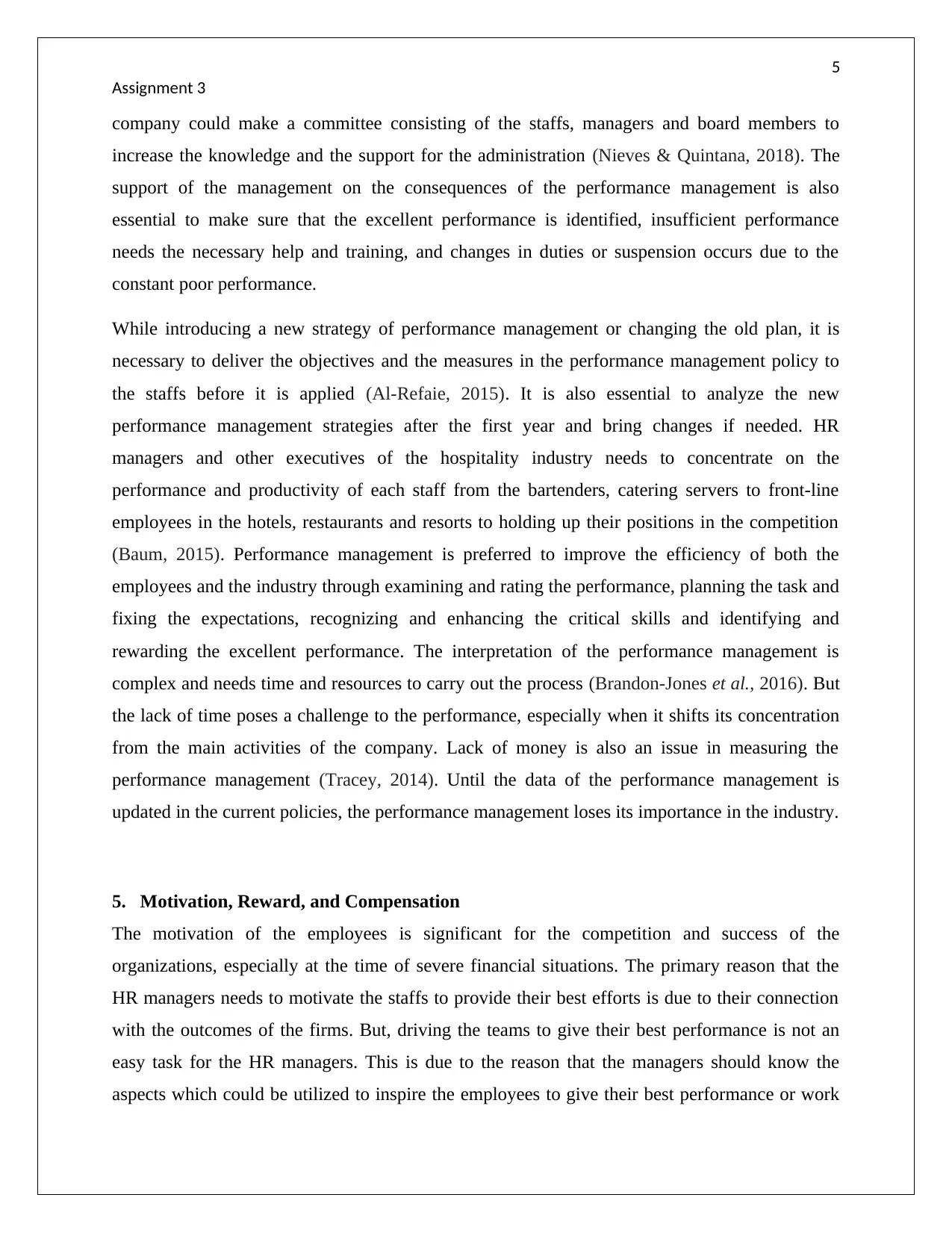
5
Assignment 3
company could make a committee consisting of the staffs, managers and board members to
increase the knowledge and the support for the administration (Nieves & Quintana, 2018). The
support of the management on the consequences of the performance management is also
essential to make sure that the excellent performance is identified, insufficient performance
needs the necessary help and training, and changes in duties or suspension occurs due to the
constant poor performance.
While introducing a new strategy of performance management or changing the old plan, it is
necessary to deliver the objectives and the measures in the performance management policy to
the staffs before it is applied (Al-Refaie, 2015). It is also essential to analyze the new
performance management strategies after the first year and bring changes if needed. HR
managers and other executives of the hospitality industry needs to concentrate on the
performance and productivity of each staff from the bartenders, catering servers to front-line
employees in the hotels, restaurants and resorts to holding up their positions in the competition
(Baum, 2015). Performance management is preferred to improve the efficiency of both the
employees and the industry through examining and rating the performance, planning the task and
fixing the expectations, recognizing and enhancing the critical skills and identifying and
rewarding the excellent performance. The interpretation of the performance management is
complex and needs time and resources to carry out the process (Brandon-Jones et al., 2016). But
the lack of time poses a challenge to the performance, especially when it shifts its concentration
from the main activities of the company. Lack of money is also an issue in measuring the
performance management (Tracey, 2014). Until the data of the performance management is
updated in the current policies, the performance management loses its importance in the industry.
5. Motivation, Reward, and Compensation
The motivation of the employees is significant for the competition and success of the
organizations, especially at the time of severe financial situations. The primary reason that the
HR managers needs to motivate the staffs to provide their best efforts is due to their connection
with the outcomes of the firms. But, driving the teams to give their best performance is not an
easy task for the HR managers. This is due to the reason that the managers should know the
aspects which could be utilized to inspire the employees to give their best performance or work
Assignment 3
company could make a committee consisting of the staffs, managers and board members to
increase the knowledge and the support for the administration (Nieves & Quintana, 2018). The
support of the management on the consequences of the performance management is also
essential to make sure that the excellent performance is identified, insufficient performance
needs the necessary help and training, and changes in duties or suspension occurs due to the
constant poor performance.
While introducing a new strategy of performance management or changing the old plan, it is
necessary to deliver the objectives and the measures in the performance management policy to
the staffs before it is applied (Al-Refaie, 2015). It is also essential to analyze the new
performance management strategies after the first year and bring changes if needed. HR
managers and other executives of the hospitality industry needs to concentrate on the
performance and productivity of each staff from the bartenders, catering servers to front-line
employees in the hotels, restaurants and resorts to holding up their positions in the competition
(Baum, 2015). Performance management is preferred to improve the efficiency of both the
employees and the industry through examining and rating the performance, planning the task and
fixing the expectations, recognizing and enhancing the critical skills and identifying and
rewarding the excellent performance. The interpretation of the performance management is
complex and needs time and resources to carry out the process (Brandon-Jones et al., 2016). But
the lack of time poses a challenge to the performance, especially when it shifts its concentration
from the main activities of the company. Lack of money is also an issue in measuring the
performance management (Tracey, 2014). Until the data of the performance management is
updated in the current policies, the performance management loses its importance in the industry.
5. Motivation, Reward, and Compensation
The motivation of the employees is significant for the competition and success of the
organizations, especially at the time of severe financial situations. The primary reason that the
HR managers needs to motivate the staffs to provide their best efforts is due to their connection
with the outcomes of the firms. But, driving the teams to give their best performance is not an
easy task for the HR managers. This is due to the reason that the managers should know the
aspects which could be utilized to inspire the employees to give their best performance or work
⊘ This is a preview!⊘
Do you want full access?
Subscribe today to unlock all pages.

Trusted by 1+ million students worldwide
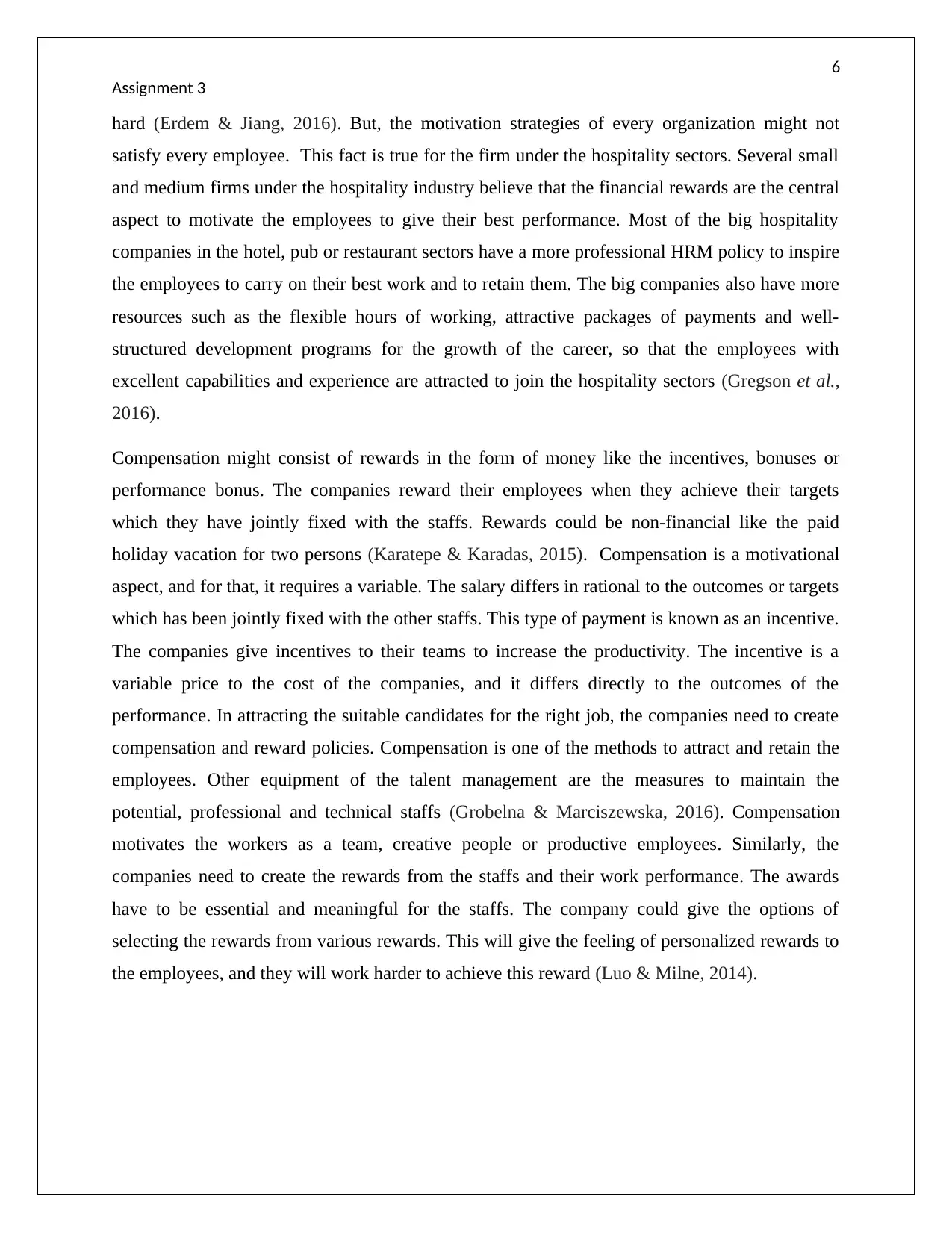
6
Assignment 3
hard (Erdem & Jiang, 2016). But, the motivation strategies of every organization might not
satisfy every employee. This fact is true for the firm under the hospitality sectors. Several small
and medium firms under the hospitality industry believe that the financial rewards are the central
aspect to motivate the employees to give their best performance. Most of the big hospitality
companies in the hotel, pub or restaurant sectors have a more professional HRM policy to inspire
the employees to carry on their best work and to retain them. The big companies also have more
resources such as the flexible hours of working, attractive packages of payments and well-
structured development programs for the growth of the career, so that the employees with
excellent capabilities and experience are attracted to join the hospitality sectors (Gregson et al.,
2016).
Compensation might consist of rewards in the form of money like the incentives, bonuses or
performance bonus. The companies reward their employees when they achieve their targets
which they have jointly fixed with the staffs. Rewards could be non-financial like the paid
holiday vacation for two persons (Karatepe & Karadas, 2015). Compensation is a motivational
aspect, and for that, it requires a variable. The salary differs in rational to the outcomes or targets
which has been jointly fixed with the other staffs. This type of payment is known as an incentive.
The companies give incentives to their teams to increase the productivity. The incentive is a
variable price to the cost of the companies, and it differs directly to the outcomes of the
performance. In attracting the suitable candidates for the right job, the companies need to create
compensation and reward policies. Compensation is one of the methods to attract and retain the
employees. Other equipment of the talent management are the measures to maintain the
potential, professional and technical staffs (Grobelna & Marciszewska, 2016). Compensation
motivates the workers as a team, creative people or productive employees. Similarly, the
companies need to create the rewards from the staffs and their work performance. The awards
have to be essential and meaningful for the staffs. The company could give the options of
selecting the rewards from various rewards. This will give the feeling of personalized rewards to
the employees, and they will work harder to achieve this reward (Luo & Milne, 2014).
Assignment 3
hard (Erdem & Jiang, 2016). But, the motivation strategies of every organization might not
satisfy every employee. This fact is true for the firm under the hospitality sectors. Several small
and medium firms under the hospitality industry believe that the financial rewards are the central
aspect to motivate the employees to give their best performance. Most of the big hospitality
companies in the hotel, pub or restaurant sectors have a more professional HRM policy to inspire
the employees to carry on their best work and to retain them. The big companies also have more
resources such as the flexible hours of working, attractive packages of payments and well-
structured development programs for the growth of the career, so that the employees with
excellent capabilities and experience are attracted to join the hospitality sectors (Gregson et al.,
2016).
Compensation might consist of rewards in the form of money like the incentives, bonuses or
performance bonus. The companies reward their employees when they achieve their targets
which they have jointly fixed with the staffs. Rewards could be non-financial like the paid
holiday vacation for two persons (Karatepe & Karadas, 2015). Compensation is a motivational
aspect, and for that, it requires a variable. The salary differs in rational to the outcomes or targets
which has been jointly fixed with the other staffs. This type of payment is known as an incentive.
The companies give incentives to their teams to increase the productivity. The incentive is a
variable price to the cost of the companies, and it differs directly to the outcomes of the
performance. In attracting the suitable candidates for the right job, the companies need to create
compensation and reward policies. Compensation is one of the methods to attract and retain the
employees. Other equipment of the talent management are the measures to maintain the
potential, professional and technical staffs (Grobelna & Marciszewska, 2016). Compensation
motivates the workers as a team, creative people or productive employees. Similarly, the
companies need to create the rewards from the staffs and their work performance. The awards
have to be essential and meaningful for the staffs. The company could give the options of
selecting the rewards from various rewards. This will give the feeling of personalized rewards to
the employees, and they will work harder to achieve this reward (Luo & Milne, 2014).
Paraphrase This Document
Need a fresh take? Get an instant paraphrase of this document with our AI Paraphraser

7
Assignment 3
Conclusion
The essay had analyzed the main challenges that a hospitality sector had been facing regarding
the HR planning where it had explained about the problems of cultural differences. The second
factor had presented the recruitment and selection procedures in retaining the employees and the
involvement of high cost in the proceedings. The third factor is the challenges and the hurdles of
employee relation that the HRM had to face in attracting and retaining the suitable staffs. The
fourth factor is the performance management of the employees, and the challenges could arise
for the employee retention. HR managers and other executives of the hospitality industry needs
to concentrate on the performance and productivity of each. The last factor had focused on the
motivation, rewards, and compensation that had discussed the several motivation and
compensation policies and the significance of rewarding the right employee. The awards have to
be essential and meaningful for the staffs. All the five themes had been highlighted and focused
on the key challenges that are faced by the hospitality industry.
Assignment 3
Conclusion
The essay had analyzed the main challenges that a hospitality sector had been facing regarding
the HR planning where it had explained about the problems of cultural differences. The second
factor had presented the recruitment and selection procedures in retaining the employees and the
involvement of high cost in the proceedings. The third factor is the challenges and the hurdles of
employee relation that the HRM had to face in attracting and retaining the suitable staffs. The
fourth factor is the performance management of the employees, and the challenges could arise
for the employee retention. HR managers and other executives of the hospitality industry needs
to concentrate on the performance and productivity of each. The last factor had focused on the
motivation, rewards, and compensation that had discussed the several motivation and
compensation policies and the significance of rewarding the right employee. The awards have to
be essential and meaningful for the staffs. All the five themes had been highlighted and focused
on the key challenges that are faced by the hospitality industry.
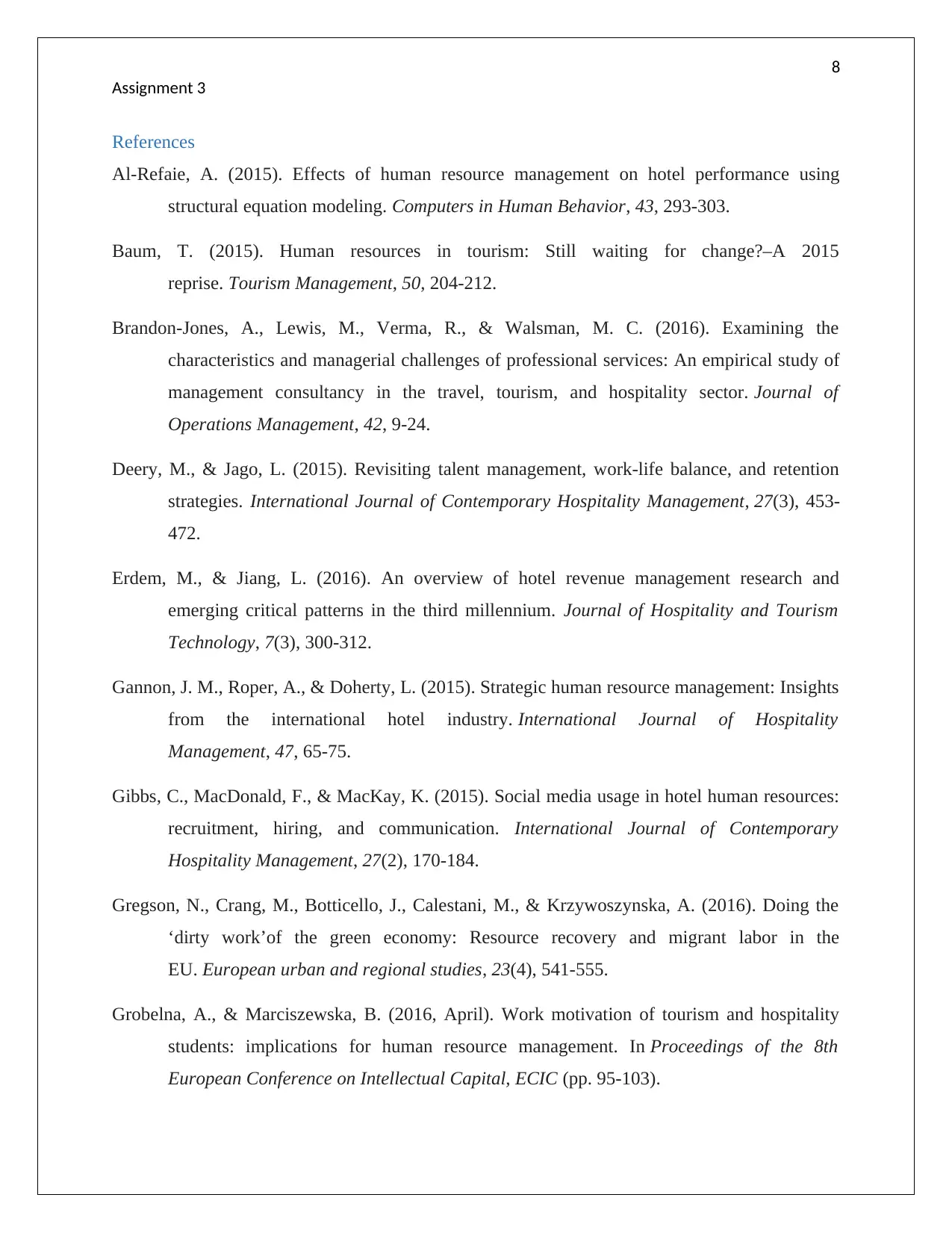
8
Assignment 3
References
Al-Refaie, A. (2015). Effects of human resource management on hotel performance using
structural equation modeling. Computers in Human Behavior, 43, 293-303.
Baum, T. (2015). Human resources in tourism: Still waiting for change?–A 2015
reprise. Tourism Management, 50, 204-212.
Brandon-Jones, A., Lewis, M., Verma, R., & Walsman, M. C. (2016). Examining the
characteristics and managerial challenges of professional services: An empirical study of
management consultancy in the travel, tourism, and hospitality sector. Journal of
Operations Management, 42, 9-24.
Deery, M., & Jago, L. (2015). Revisiting talent management, work-life balance, and retention
strategies. International Journal of Contemporary Hospitality Management, 27(3), 453-
472.
Erdem, M., & Jiang, L. (2016). An overview of hotel revenue management research and
emerging critical patterns in the third millennium. Journal of Hospitality and Tourism
Technology, 7(3), 300-312.
Gannon, J. M., Roper, A., & Doherty, L. (2015). Strategic human resource management: Insights
from the international hotel industry. International Journal of Hospitality
Management, 47, 65-75.
Gibbs, C., MacDonald, F., & MacKay, K. (2015). Social media usage in hotel human resources:
recruitment, hiring, and communication. International Journal of Contemporary
Hospitality Management, 27(2), 170-184.
Gregson, N., Crang, M., Botticello, J., Calestani, M., & Krzywoszynska, A. (2016). Doing the
‘dirty work’of the green economy: Resource recovery and migrant labor in the
EU. European urban and regional studies, 23(4), 541-555.
Grobelna, A., & Marciszewska, B. (2016, April). Work motivation of tourism and hospitality
students: implications for human resource management. In Proceedings of the 8th
European Conference on Intellectual Capital, ECIC (pp. 95-103).
Assignment 3
References
Al-Refaie, A. (2015). Effects of human resource management on hotel performance using
structural equation modeling. Computers in Human Behavior, 43, 293-303.
Baum, T. (2015). Human resources in tourism: Still waiting for change?–A 2015
reprise. Tourism Management, 50, 204-212.
Brandon-Jones, A., Lewis, M., Verma, R., & Walsman, M. C. (2016). Examining the
characteristics and managerial challenges of professional services: An empirical study of
management consultancy in the travel, tourism, and hospitality sector. Journal of
Operations Management, 42, 9-24.
Deery, M., & Jago, L. (2015). Revisiting talent management, work-life balance, and retention
strategies. International Journal of Contemporary Hospitality Management, 27(3), 453-
472.
Erdem, M., & Jiang, L. (2016). An overview of hotel revenue management research and
emerging critical patterns in the third millennium. Journal of Hospitality and Tourism
Technology, 7(3), 300-312.
Gannon, J. M., Roper, A., & Doherty, L. (2015). Strategic human resource management: Insights
from the international hotel industry. International Journal of Hospitality
Management, 47, 65-75.
Gibbs, C., MacDonald, F., & MacKay, K. (2015). Social media usage in hotel human resources:
recruitment, hiring, and communication. International Journal of Contemporary
Hospitality Management, 27(2), 170-184.
Gregson, N., Crang, M., Botticello, J., Calestani, M., & Krzywoszynska, A. (2016). Doing the
‘dirty work’of the green economy: Resource recovery and migrant labor in the
EU. European urban and regional studies, 23(4), 541-555.
Grobelna, A., & Marciszewska, B. (2016, April). Work motivation of tourism and hospitality
students: implications for human resource management. In Proceedings of the 8th
European Conference on Intellectual Capital, ECIC (pp. 95-103).
⊘ This is a preview!⊘
Do you want full access?
Subscribe today to unlock all pages.

Trusted by 1+ million students worldwide
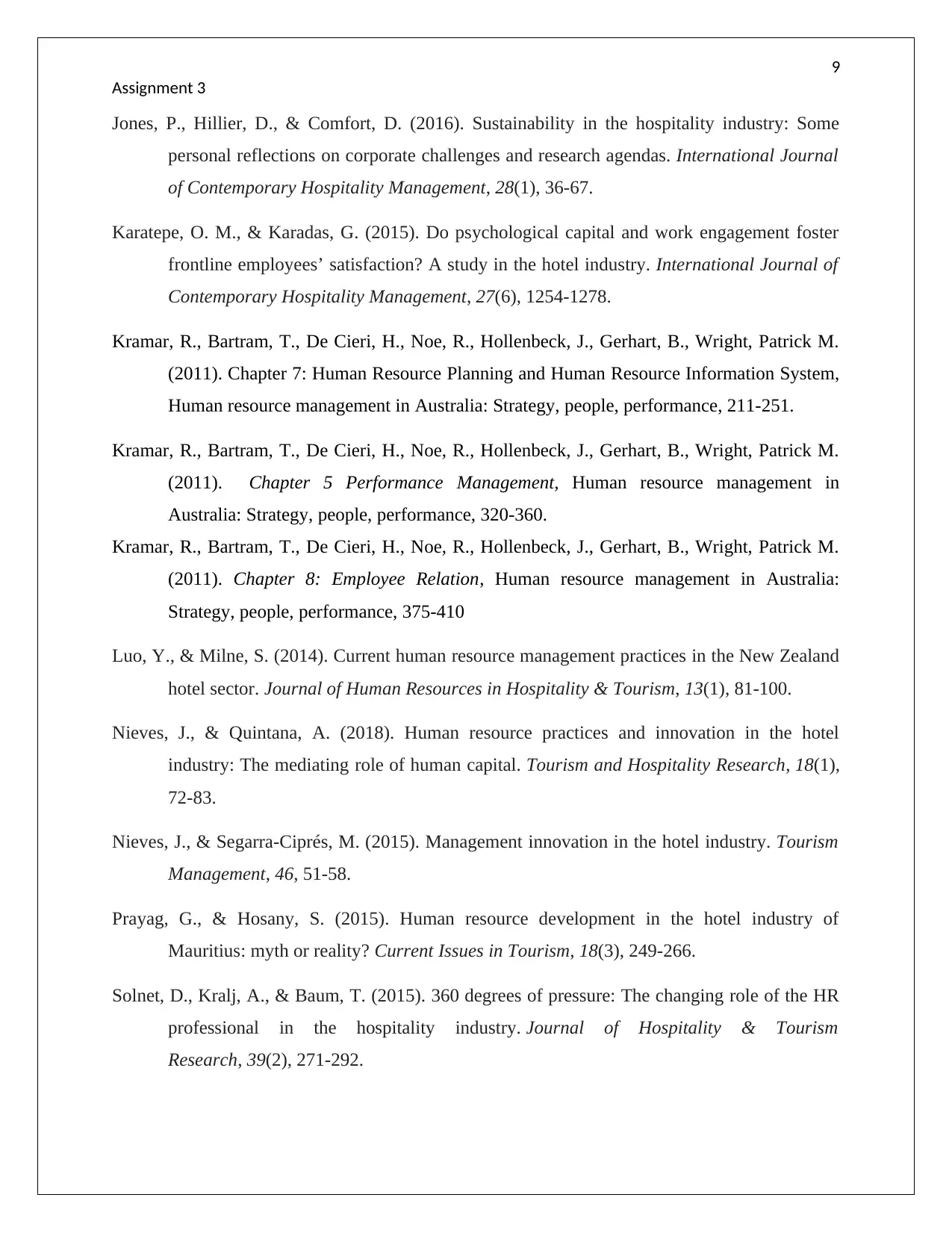
9
Assignment 3
Jones, P., Hillier, D., & Comfort, D. (2016). Sustainability in the hospitality industry: Some
personal reflections on corporate challenges and research agendas. International Journal
of Contemporary Hospitality Management, 28(1), 36-67.
Karatepe, O. M., & Karadas, G. (2015). Do psychological capital and work engagement foster
frontline employees’ satisfaction? A study in the hotel industry. International Journal of
Contemporary Hospitality Management, 27(6), 1254-1278.
Kramar, R., Bartram, T., De Cieri, H., Noe, R., Hollenbeck, J., Gerhart, B., Wright, Patrick M.
(2011). Chapter 7: Human Resource Planning and Human Resource Information System,
Human resource management in Australia: Strategy, people, performance, 211-251.
Kramar, R., Bartram, T., De Cieri, H., Noe, R., Hollenbeck, J., Gerhart, B., Wright, Patrick M.
(2011). Chapter 5 Performance Management, Human resource management in
Australia: Strategy, people, performance, 320-360.
Kramar, R., Bartram, T., De Cieri, H., Noe, R., Hollenbeck, J., Gerhart, B., Wright, Patrick M.
(2011). Chapter 8: Employee Relation, Human resource management in Australia:
Strategy, people, performance, 375-410
Luo, Y., & Milne, S. (2014). Current human resource management practices in the New Zealand
hotel sector. Journal of Human Resources in Hospitality & Tourism, 13(1), 81-100.
Nieves, J., & Quintana, A. (2018). Human resource practices and innovation in the hotel
industry: The mediating role of human capital. Tourism and Hospitality Research, 18(1),
72-83.
Nieves, J., & Segarra-Ciprés, M. (2015). Management innovation in the hotel industry. Tourism
Management, 46, 51-58.
Prayag, G., & Hosany, S. (2015). Human resource development in the hotel industry of
Mauritius: myth or reality? Current Issues in Tourism, 18(3), 249-266.
Solnet, D., Kralj, A., & Baum, T. (2015). 360 degrees of pressure: The changing role of the HR
professional in the hospitality industry. Journal of Hospitality & Tourism
Research, 39(2), 271-292.
Assignment 3
Jones, P., Hillier, D., & Comfort, D. (2016). Sustainability in the hospitality industry: Some
personal reflections on corporate challenges and research agendas. International Journal
of Contemporary Hospitality Management, 28(1), 36-67.
Karatepe, O. M., & Karadas, G. (2015). Do psychological capital and work engagement foster
frontline employees’ satisfaction? A study in the hotel industry. International Journal of
Contemporary Hospitality Management, 27(6), 1254-1278.
Kramar, R., Bartram, T., De Cieri, H., Noe, R., Hollenbeck, J., Gerhart, B., Wright, Patrick M.
(2011). Chapter 7: Human Resource Planning and Human Resource Information System,
Human resource management in Australia: Strategy, people, performance, 211-251.
Kramar, R., Bartram, T., De Cieri, H., Noe, R., Hollenbeck, J., Gerhart, B., Wright, Patrick M.
(2011). Chapter 5 Performance Management, Human resource management in
Australia: Strategy, people, performance, 320-360.
Kramar, R., Bartram, T., De Cieri, H., Noe, R., Hollenbeck, J., Gerhart, B., Wright, Patrick M.
(2011). Chapter 8: Employee Relation, Human resource management in Australia:
Strategy, people, performance, 375-410
Luo, Y., & Milne, S. (2014). Current human resource management practices in the New Zealand
hotel sector. Journal of Human Resources in Hospitality & Tourism, 13(1), 81-100.
Nieves, J., & Quintana, A. (2018). Human resource practices and innovation in the hotel
industry: The mediating role of human capital. Tourism and Hospitality Research, 18(1),
72-83.
Nieves, J., & Segarra-Ciprés, M. (2015). Management innovation in the hotel industry. Tourism
Management, 46, 51-58.
Prayag, G., & Hosany, S. (2015). Human resource development in the hotel industry of
Mauritius: myth or reality? Current Issues in Tourism, 18(3), 249-266.
Solnet, D., Kralj, A., & Baum, T. (2015). 360 degrees of pressure: The changing role of the HR
professional in the hospitality industry. Journal of Hospitality & Tourism
Research, 39(2), 271-292.
Paraphrase This Document
Need a fresh take? Get an instant paraphrase of this document with our AI Paraphraser
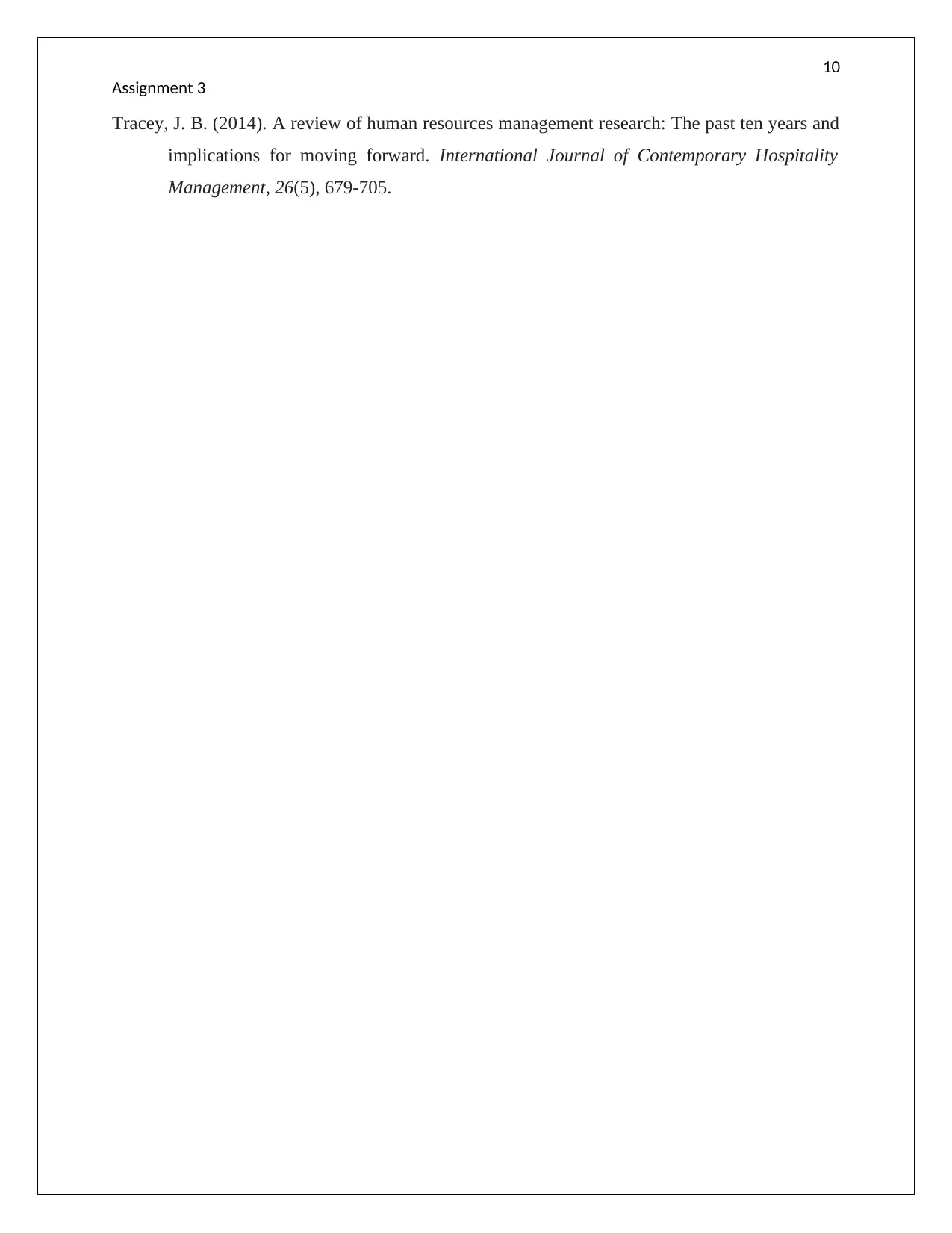
10
Assignment 3
Tracey, J. B. (2014). A review of human resources management research: The past ten years and
implications for moving forward. International Journal of Contemporary Hospitality
Management, 26(5), 679-705.
Assignment 3
Tracey, J. B. (2014). A review of human resources management research: The past ten years and
implications for moving forward. International Journal of Contemporary Hospitality
Management, 26(5), 679-705.
1 out of 11
Related Documents
Your All-in-One AI-Powered Toolkit for Academic Success.
+13062052269
info@desklib.com
Available 24*7 on WhatsApp / Email
![[object Object]](/_next/static/media/star-bottom.7253800d.svg)
Unlock your academic potential
Copyright © 2020–2026 A2Z Services. All Rights Reserved. Developed and managed by ZUCOL.




